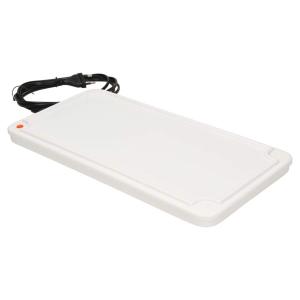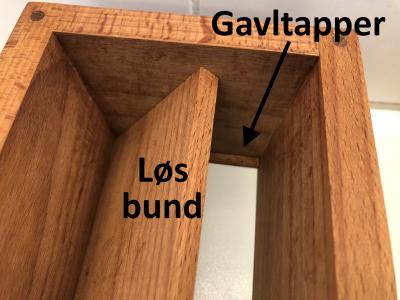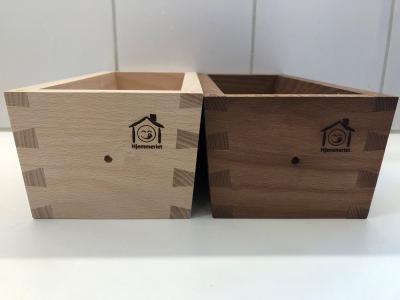Baking moulds/forms in solid beech wood - Frame and loose base.
The wooden frame is approximately 1.6 cm thick, the base approximately 1 cm thick.
The wooden frame has slightly angled sides, which facilitate the removal of the bread after baking. The edges of the base, in the longitudinal direction, are correspondingly angled and the base must therefore be positioned so that the sides and base fit together.
The baking moulds come in 4 sizes - see picture 1.
The dimensions can be seen in the table below.
The 2 outermost moulds in the picture are "baked in" and show how the wood change color through use.
The 2 middle moulds in the picture show moulds that have not yet been used - and the base only falls down, into place, after baking.
Picture 2 shows the end studs on which the base rests.
The moulds are made of solid beech wood and assembled only by means of swallow tails and dowels. No screws or the like are used, just good old-fashioned craftsmanship. In one end there is a hole that fits a baking thermometer (not included).
Beech wood is extremely suitable for food use, and the moulds are not treated with oils, chemicals or anything else. They provide gentle baking, wonderful aroma development, airy crumb and a suitably crispy crust. They are particularly suitable for sourdough bread, which typically needs to be baked longer at a low temperature. Note that the mould must not be baked at higher temperatures than 200°C.
The bottom is loose and slightly shorter than the mould itself. When the mould is delivered, the base does NOT fit in the width (the light moulds in picture 1), but after baking, the base will shrink a little and fall into the mould, where it rests on the pins in the ends of the mould (picture 2). The advantage of the base is that if you don't want a hard baked crust/base, the base protect the bread dough during baking.
The wooden moulds come in 4 sizes - below you can see the dimensions of the moulds.
| |
Volume |
Dough weight |
Inner dimensions (cm) |
Outer dimensions (cm) |
Weight |
| Mould |
liter |
kg |
Length |
Width |
Height |
Length |
Width |
Height |
g |
| Theo |
0,9 |
0,5 - 0,7 |
12,8 |
Top
10,4
Bottom
8,8 |
7,0 |
16,0 |
Top
13,6
Bottom
11,8 |
8,4 |
540 |
| Tom |
1,3 |
0,7 - 1,0 |
19,4 |
22,5 |
750 |
| Jonathan |
2,0 |
1,0 - 1,4 |
25,8 |
8,0 |
29,0 |
9,3 |
1050 |
| Malthe |
2,3 |
1,4 - 1,7 |
29,3 |
32,5 |
1100 |
Soon, only models Jonathan and Malthe will be available. Measures will then look like:
| |
Volume |
Dough weight |
Innerdimensions (cm) |
Outer dimensions (cm) |
Weight |
| Mould |
liter |
kg |
Length |
Width |
Height |
Length |
Width |
Height |
g |
| Jonathan |
2,0 |
1,0 - 1,4 |
25,8 |
Top 10,4
Bund 8,8 |
8,0 |
29,0 |
Top 13,6
Bund 11,8 |
9,3 |
1050 |
| Malthe |
2,3 |
1,4 - 1,7 |
29,3 |
32,5 |
1100 |
Baking in the mould of beech wood with a loose base
- The baking mould is only assembled by means of swallow tails and dowels.
- Beech wood is suitable for food use.
- The moulds provide gentle baking and wonderful aroma development.
- The breads get an airy crumb and crispy crust.
- Particularly suitable for rye or wheat bread, sourdough products, etc.
- Can also be used for e.g. mincemeat - then it fits as a topping for the bread...
Commissioning
- BEFORE the mould and base are used, they must be greased with cooking oil such as e.g. rapeseed, sunflower or olive oil.
Brush thoroughly, inside and out, with ½-1 dl vegetable oil a few times. Then let it dry.
- Baking: Put the oiled mould and base - without dough - in a 180°C hot oven and bake for 45-50 minutes. The wood will thereby sweat, possibly excess oil out and the base will partially or fully fall down and rest on the gable pins.
At the same time, the beech wood will begin to darken - patina.
- Before each baking, grease the inside of the mould and base with liquid vegetable margarine or similar - see the instruction videos in the video tab.
NOTE the following:
- The moulds are made of solid beech, long-lasting, without coatings, metal or chemicals - no aggressive materials.
- The bottoms are loose bottoms and approximately 1-1.5 mm shorter than the mould. The mould is delivered with the base positioned approximately 10-15 mm up - after baking and subsequent cooling, or after the first baking, the base will shrink in width and thereby fall down and rest on the studs in the gables.
Insignificant opening along the sides will occur after baking. The base is inserted as on delivery - 5° angle. The bases have an upper and lower side due to the conical design of the mould.
- When baking, the moulds and base will dry out and shrink to a lesser extent.
Since beech wood is an organic material that works under temperature influences, the tenon joints can open slightly and the dowels shift.
This is natural and does not affect functionality.
The wood patinas and darkens through baking.
- The mould must not be baked at a higher temperature than 200°C.
- Cleaning - with a brush or palette knife after cooling.
- ATTENTION: DO NOT PUT IN THE DISHWASHER!
Certain types of bread are not suitable for free-standing baking because the dough is too soft or must rise for a long time (12-14 hours). These loaves must have a mould. The most common is to use tin or aluminum metal moulds - but these moulds are not recommended. If the bread is to rise for a long time, you must be aware that during the rising, e.g. lactic acid, which is aggressive towards metal. The developed acid can affect metal and cause rust formations. It is also known that aluminum moulds give off substances to the bread. Some have reported that their bread tasted of aluminum and got stains when using aluminum pans. A better solution is to use moulds made of wood, glass, stainless steel or ceramic.
The bakery Aurion has tried baking pumpernickel bread in wooden frames on well-baked iron plates, but these immediately began to rust when the bread was taken out of the mould and the oxygen was given free rein. Today, Aurion always uses oiled baking paper on a stainless steel plate.
With rapid yeast rising, acid does not form, as it does with sourdough, baker's yeast and the honey-salt rising method. Therefore, it is important here to use wooden moulds or stainless steel moulds.
 See Product Group
See Product Group



















































































































































































 In stock
In stock 



 2/1
- Visitors: 1489761 - 1
2/1
- Visitors: 1489761 - 1